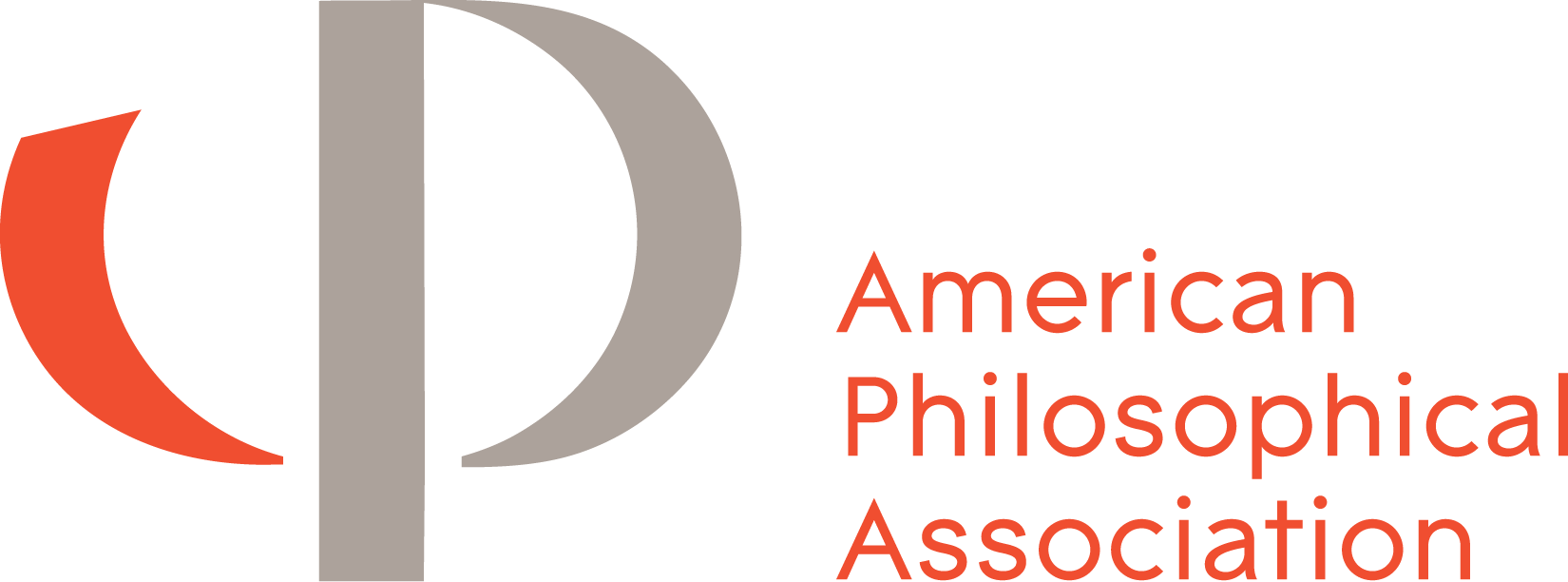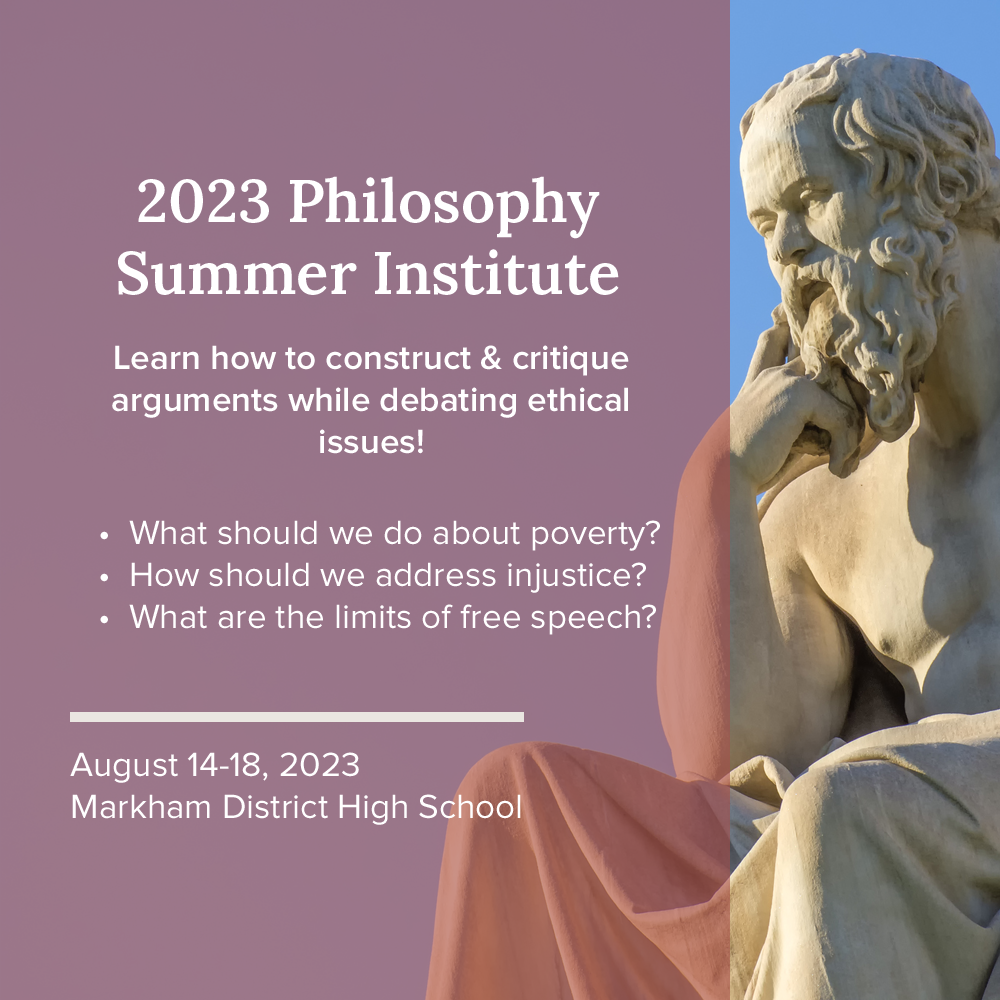2024 Philosophy Summer Academy
Location: Markham District High School (89 Church St, Markham ON L3P 2M3)
Time: 9:30am - 4:00pm
Program Price: $200
*Daily lunch option included
Dates:
July 29 - August 2
August 12 - August 16
Politics, Law, & Philosophy
Learn to critically think about modern political and legal issues in Canada and the world!
Applied Ethics & Social Issues
Develop your logical reasoning by constructing ethical solutions to contemporary social issues!
“The program was interesting and fun. The instructors were well-informed and invited you to consider all opinions whilst challenging your own. They promoted and achieved an inclusive environment where everyone was free to share their thoughts.” — Student, 2023 Philosophy Summer Academy
-
Day 1: Foundations of Politics - Students will learn about and discuss issues relating to the foundations of politics. Are there objective moral facts? What makes actions right or wrong?
Day 2:The Problem of Political Authority - Students will discuss and debate whether political authority is ever justified, including historical and modern arguments for and against it.
Day 3: Democratic Theory - After evaluating justifications for government, students will consider democracy in particular. Is more democratic decision-making always better? How does misinformation affect democracy, and what can we do about it?
Day 4: Applied Topics in Political Philosophy - Topics may include the ethics and morality of war, climate change, trust and transparency, free markets and regulation, and medical ethics.
Day 5: Philosopher’s Conference and Pizza Lunch - Students will come up with their own arguments about the topics we have discussed this week, considering possible objections and replies in order to strengthen their positions.Applied Ethics & Social Issues
Day 1: An Introduction to Ethical Theories - Students will become acquainted with the foundational concepts in ethical theory, such as rights, duties, and various ethical theories.
Day 2: Aiding, Saving, and Welfare - Students will learn about and debate duties of beneficence through questions like: How much should we benefit others, and in what cases? Do we have a duty to donate to charity? How much of a duty do we have to mitigate climate change to benefit future generations who do not yet exist?
Day3:To Harm or Not To Harm - Students will learn about and debate duties of non-maleficence, the duty not to harm. How extensive are these duties? Are animals more exempt from this principle, and is factory farming ethically permissible? What about in medical contexts? Is euthanasia ever ethically permissible in light of Canada’s MAiD legalization?
Day4: The Ethics of (Dis)Obedience - Students will learn about and debate duties to obey and promissory duties. How strong are these duties, and could other duties outweigh it? Is whistleblowing ever permissible (or even obligatory), such as in the case of Edward Snowden? Is deception ever permissible?
Day 5: Philosopher’s Conference and Pizza Lunch - Students will come up with their own arguments about the topics we have discussed this week, considering possible objections and replies in order to strengthen their positions. -
By the end of this program, students will be able to:
Identify the parts of an argument. Students will learn what an argument is, the parts of an argument, and most importantly, what makes a well-reasoned argument.
Reconstruct an argument from a text. Students will learn how to identify the premises and conclusion of an argument from many texts, and how to reconstruct the argument in its logical form.
Evaluate the strength of an argument. Building upon their argument reconstruction skills, students will learn to critically evaluate an argument by analyzing its logical structure and the truth of its premises.
Develop convincing objections and replies. Students will learn to clearly and concisely communicate why an argument fails or succeeds, based on their critical analysis. They will apply this to form well-reasoned opinions on philosophical issues.
-
09:30 - 10:00 Case Study: Democracy in peril?
10:00 - 10:30 Discussion: Case analysis
10:30 - 11:30 Lesson: Arguments for democracy via the wisdom of the crowds thesis
11:30 - 12:00 Open discussion
12:00 - 13:00 Lunch break
13:00 - 13:30 Activity: Critically assessing the arguments
13:30 - 14:30 Lesson: The tragedy of the commons and democratic decision-making
14:30 - 15:30 Activity: Critically assessing the objections
15:30 - 16:00 Afternoon games and activities -
Daily catered lunch option included in program fee
Program Content
Lessons and lectures
Learning activities (case studies, simulations, debates, discussions)
Program Materials
Philosophy For Youth folder
Philosophy For Youth pen
Name tag
Handouts and readings
Session information
Opportunity to make new connections and learn about university programs and admissions!
Meet The Team
Victor Chung
University of Toronto
Victor is a Race, Ethics, and Power Project Fellow at the University of Toronto Centre for Ethics. He has presented his research at various academic conferences, including at the Berlin Social Science Center, the University of London (UK), KU Leuven (Belgium), and the American Philosophical Association.
Fallon Taylor-Kanary
University of Toronto
York University
Fallon is an MA graduate student at York University in the Social & Political Thought program. She graduated from the University of Toronto, receiving her Honours Bachelor of Arts as a philosophy specialist. Her research interests include social and political philosophy, particularly feminist philosophy.
Coye Zhou
University of Waterloo
Coye studies at the University of Waterloo, where she is working towards a co-op degree in philosophy. Exposure to philosophy gave her the chance to develop many skills that she continues to use every day: reading carefully, writing clearly, and analyzing issues from multiple perspectives.
Generously sponsored by the American Philosophical Association
Past Programs
2023 Philosophy Summer Institute
A week-long summer program for high school students, where students develop valuable, widely-applicable skills such as:
Constructing and presenting well-reasoned arguments
Engaging in logical reasoning to analyze the strength of an argument
Communicating clearly and concisely to persuade others
…all while discussing and learning about philosophy!







